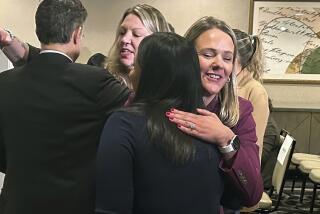SANTA ANA : AIDS Patient Settles With Blood Banks
- Share via
A Corona woman who contracted HIV and then came down with AIDS from tainted donated blood has reached a settlement with a hospital, two blood banks and two doctors involved in giving her the blood.
Catalina Grigley received the transfusion during an operation to replace a faulty heart valve at Fountain Valley Regional Hospital and Medical Center in August, 1989, said Bonnie Lawley, Grigley’s lawyer. Under terms of the legal settlement ordered sealed by the court, Lawley could not reveal the amount awarded to Grigley, 51, who lived in Huntington Beach at the time of the surgery.
“The tragedy of this whole situation is that my client’s life could’ve been saved with a $4 test,” Lawley said. Technicians in Oklahoma screened the blood, she said, but used a test that does not detect HIV in blood given by donors who got the virus a short time before giving blood.
Blood given to Grigley during surgery was drawn at the Oklahoma Blood Institute in Oklahoma City, Lawley said, shipped to the American Blood Institute in Los Angeles and finally to the Fountain Valley hospital. The blood had been screened for HIV using an “antibody test,” Lawley said.
Such a test only detects the presence of HIV in blood donors after they have had the virus long enough to build up antibodies, Lawley said. She maintains that an “antigen test,” which was not used on the blood, could have detected the virus during the window of time before the antibody test is useful.
But the antibody test is “the only test that’s authorized to test donated blood,” said Scott Martin, a Santa Ana lawyer representing the blood banks. “The only purpose for which the (antigen) test is licensed . . . is in the treatment of known HIV patients.”
Martin said he believes Lawley violated the spirit of the settlement by conducting a press conference about it Tuesday, and he will talk with his clients about possibly rescinding the settlement and continuing with litigation instead. Martin maintains the blood banks did all they could do to screen blood for HIV.
Lawley said Grigley found out she had the virus three months after surgery.
When the original blood donor in Oklahoma City returned to the blood bank to give blood again in November, 1989, technicians detected the AIDS virus, Lawley said. They advised doctors in Los Angeles to ask Grigley to get an HIV test, and the results were positive.
Because Grigley is from the Philippines and does not understand English well, Lawley said, she did not realize that paperwork she completed at the hospital before the operation included arrangements for a blood transfusion. “She would’ve given blood in advance for herself if someone told her she might need a transfusion,” she added.
Grigley said in a telephone interview that doctors told her in 1989 that she had five to seven years to live.
“I used to have a lot of friends,” said Grigley, who is divorced. “I used to go to their houses and visit them--we would go out to dinner, go dancing, go bowling, but now I can’t even go to their house anymore. They told me they’re afraid to be with me.”
More to Read
Sign up for Essential California
The most important California stories and recommendations in your inbox every morning.
You may occasionally receive promotional content from the Los Angeles Times.










